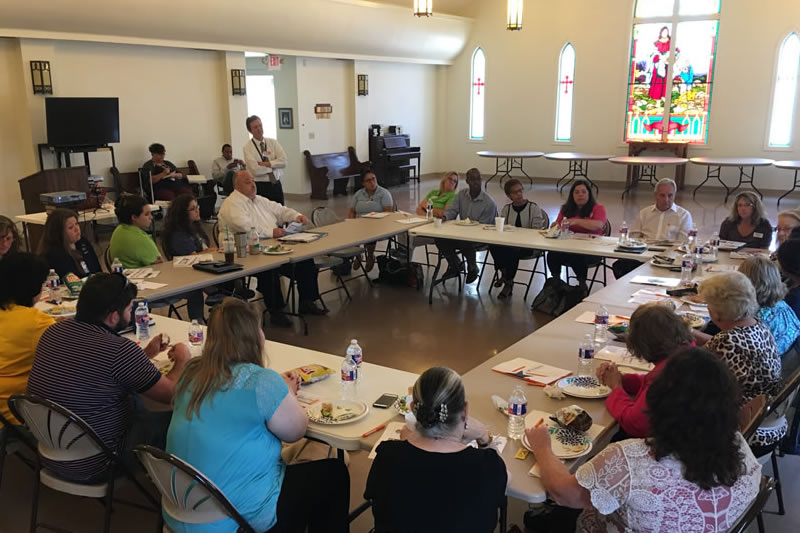Goal 2:
Activate Communities by strengthening organizations and congregations to build health-promoting communities
Our faith tradition tells us that we exist not alone but in community. We are called to know and care for our neighbors, especially the poor and powerless. The Episcopal church has a long history of building human connections; this is core to our mission. In the Episcopal Diocese of Texas, the Church emphasizes the mission of the church is to go into the world and find Christ. In this sense, EHF’s work is aligned with the work of the Episcopal Church. Consequently, EHF’s Congregational Engagement team works closely with Diocesan staff to coordinate and leverage work with the churches. Our Community Engagement team works similarly to advance alignment, focusing on broader community organizations and institutions. Through this work, we hope to raise the voices of all people and build connections that transcend difference. This goal reflects our belief that healthy communities are created when diverse people join together to develop community-driven, people-centered, health-oriented systems.
EHF understands that successful, sustainable solutions to complex challenges require the input of those most affected by the issues. Too often, when a group wants to help others, they develop programs they assume the beneficiaries want and need—without engaging with the intended beneficiaries. This is not only disrespectful, but it runs the risk of failure due to lack of understanding of the true wants and needs of intended beneficiaries. If we want to help, we need to engage those we seek to benefit so that we work alongside them, supporting them in developing solutions that are meaningful to them. This will lead to more successful, sustainable solutions.
Targeted Outcome 3:
Community and congregation members actively shape healthy communities and influence health systems to improve health equity
This outcome articulates how we envision activating communities to engage meaningfully in addressing health-related opportunities and challenges. We will work with and through community organizations and our congregations to accomplish this work.
Strategy 6: Raise Community Voices
Support organizations to raise the voices of community members to influence community health
We will work with community organizations that are interested in and capable of engaging community members, particularly low-income and vulnerable populations, to become advocates for health. Our primary mechanisms for advancing this strategy include technical assistance to help organizations learn how to do meaningful community engagement work and financial support to organizations that work actively and effectively with community members.
Examples of work within this strategy include increasing the number and reach of grassroots community organizing groups that advocate for community health; supporting the development of new leaders within communities; ensuring that client-facing community partners have the skills and resources they need to actively engage those they serve as influential beneficiaries; developing new and strengthening existing health coalitions; and supporting community organizations in using hospital community benefit data to encourage investment in social determinants of health.
Strategy 7: Support Congregations In Action
Support congregations to address community health
We recognize the important role the faith community can play in creating conditions to promote community health. We will support the Episcopal Diocese of Texas and its 150+ congregations as they work with their neighbors to improve community health. While EHF’s work is narrowly focused as described in this plan, the congregations are pursuing a broad variety of different opportunities, as determined by their leadership and informed by their communities. Our role is to support the congregations in learning how to do community-engaged work. Our staff members work with congregations to help them establish their own sustainable, effective ministries to advance the development of healthy communities; we provide churches with consultants, conference tuition, and a variety of trainings that benefit them as they get to know their neighbors and work alongside them in improving community health; and we support the connections between our congregations and the health sector institutions in their communities. We are successful when our congregations are meaningfully engaged in their communities.
Examples of work within this strategy include supporting congregations that work on root causes of poor health such as poverty alleviation and racial reconciliation. We also work with congregations wanting to engage in helping their neighbors through food security, educational programs, youth mentoring, and mental health stigma reduction, and more. We help these congregations understand their communities, engage effectively with community members and organizations, and plan meaningful and sustainable work.
